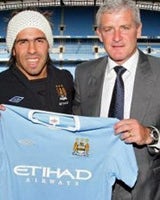Analysis: Building the Manchester City brand
Nouveau riche Premier League club Manchester City has been splashing Abu Dhabi United Group’s cash this week as if it was burning a hole in their considerable pockets.

The last seven days have seen City bring in Carlos Tevez from neighbours Manchester United, all but sign Arsenal forward Emmanuel Adebayor and an audacious attempt to prise Chelsea captain John Terry away from Stamford Bridge – all moves that signal the club’s on-field ambitions.
Off the field, the executive team is also looking to capitalise on the team’s increased exposure with marketing nous.
The latest stage of rebuilding brand Manchester City came with the appointment of digital agency iCrossing to manage all natural, paid search and social media for the Eastlands-based club.
The appointment followed the June relaunch of their new Poke created website, which will feature video content developed by Big Brother producer Endemol.
Personnel wise, the club has been gearing up for a marketing push by hiring Chris Kay, former head of account management at Fallon, as head of marketing and former Aegis man David Pullan to lead brand development.
City were also quick to snap up a global brand as shirt sponsor, signing a reported £40m deal with airline Etihad earlier this year, after incumbent Thomas Cook decided not to renew.
Pullan says the recent appointments are about “employing some traditional marketing rigour”, adding the club needs the “key marketing elements in place” to build global recognition of the brand.
To this end, the club has also appointed strategic marketing consultancy Flamingo International to explore, Pullan says, how City can “connect” with markets around the world.
Julian Ireland, planning director at iCrossing, says its task is “maximising worldwide interest” in the club’s “assets” such as newly signed Argentinean Tevez.
City have some way to go to match local rivals Manchester United, widely recognised to be the benchmark in this area. Manchester United has “official partnerships” with brands around the world with the aim of maximising global revenue. The Reds also have a number of superstores selling branded merchandise in South East Asia and this week announced the opening of their first café in India.
Elsewhere, Chelsea have diversified into hotels, restaurants and a travel company using the Chelsea Village brand since the West Londoners became the last English team transformed by a billionaire’s benevolence in 2003.
Antony Marcou, managing director of sports marketing agency Sports Revolution, says although the club “has been making all the right noises” by appointing marketing expertise, it still has considerable ground to make up on the likes of Chelsea and Manchester United when it comes to international recognition.
“The club needs to build the brand on the ground through opening retail operations in places such as South East Asia so fans can get close to the brand,” he says.
The latest Deloitte football rich list confirms the mountain City have to climb. The club generated £82.3m in revenues during the 2007/2008 season, significantly behind English rivals Arsenal on £209m, Chelsea on £212m and Manchester United on £257m and way behind leaders Real Madrid on £289m.
City are busy building a roster of on-field marketable “assets” that in turn should bring on-pitch success, which Pullan recognises as the “key driver” to building the Premier League club’s global appeal. The club’s paymasters are certainly not lacking in ambition or resources to achieve their previously stated aim to be one of the “biggest football brands on the planet”.




